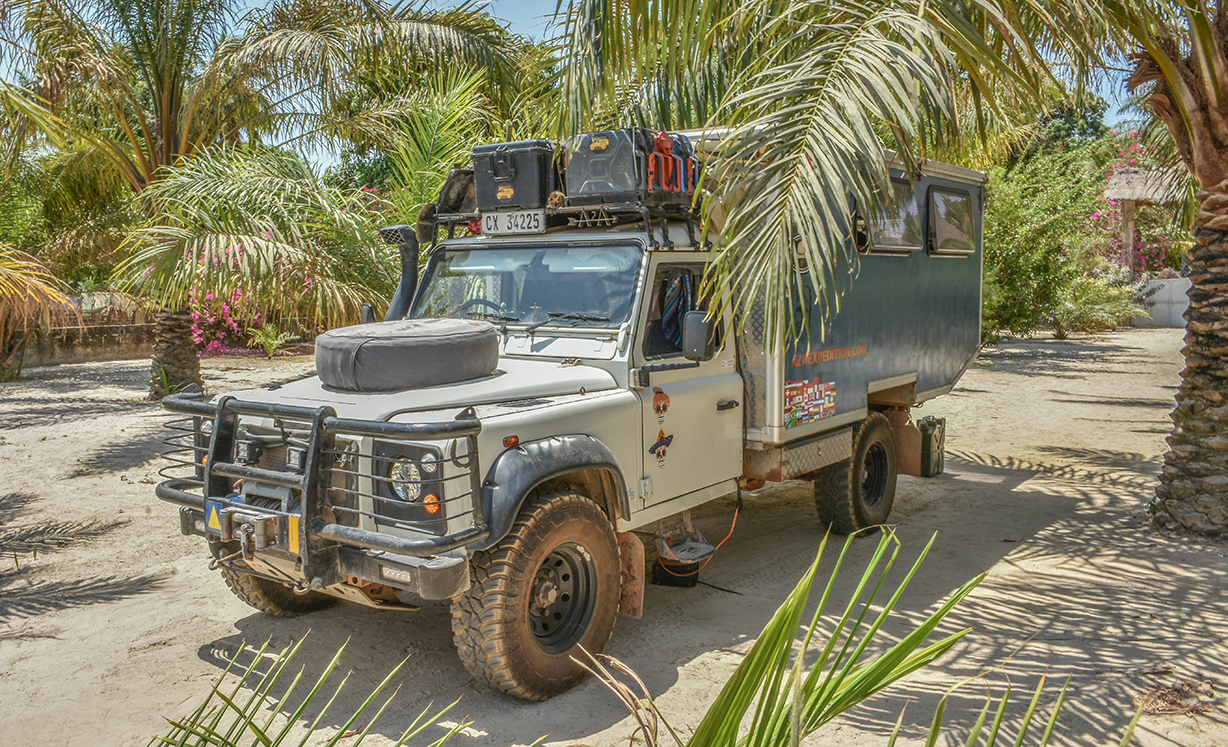A lifetime ago my family and I drove our Land Rover from Peru into Ecuador. The Peruvian coast is an endless sea of sand, dry cities and unloved desert. After dropping down from the heavenly Andes and her eternal switchbacks the straight coastal road is both a relief and a beautiful bore. After days of khaki desert you eventually reach the border post and cross into Ecuador to be greeted by green grass, banana plantations, flowers, trees, rivers! We ate bananas, rolled on the grass until we itched then sat in the shade of a cool tree.
The crossing from Mauritania to Senegal is a similar sensational contrast. But first you have to negotiate a terrible road to the Dakla border where the Senegalese welcome you with an elaborate scam – a vehicle traveling without a carnet de passage is charged an unofficial fee of $300 US to enter. There exists no legislation to support this claim but the officials enforce their “law” with vested interest. We had procured a carnet from our bureaucracy in South Africa to ensure that we would not fall pray to this and other unofficial costs as we made our way down the west coast of Africa. Luisa has seen us through over a hundred border crossings and knows how to play the game without opening her purse, she laughs and jokes and scowls and protests until the uniform relents and allows us to proceed as we rightly should.

With the sands of the Sahara behind us we drove into Port Louis as the sun set, amazed by the clean streets, trees, colourful clothing, cheerful smiles, rivers and flowers and grasslands. In the city, over a bridge, we found a neighbourhood populated by blocks of colonial architecture and Frenchmen. A small boutique run by an amicable Frenchman sold us French cheese, ham, bacon, bread, steak and wine. Our camp for the night lay at the end of a long narrow road bordered by a fish market, fishermen, ice trucks, buses, stalls, goats and the pungent smell of fish not sold. At the camp a small tent sat in the corner under a tree, occupied but still (the next morning we met the occupant, an amicable and talkative Englishman who had cycled 100 000 miles and was on his way south). Luisa and I enjoyed a legal glass of wine (alcohol is illegal in Mauritania) and the sea breeze while the children relaxed and waited for dinner. That night was to be our first free of the sandstorms which had assaulted us constantly in Mauritania. Unfortunately the entry to Port Louis was not a sign of the general wealth and beauty of Senegal but after the poverty and chaos of Nouakchott, Senegal seemed at least marginally wealthy.

If you have ever walked the streets of southern Europe you might have met more than a few West African men selling luxury hand bags, belts and shoes. Chances are great that the friendly trader in the shadow of Pisa is Senegalese and if he is chances are even better that he is a Mouride. The Mourides are more than a tribe, they are a community of traders. The founder Amadou Bamba is said to have stepped off a boat taking him to exile in Ghana. A prayer mat had magically appeared on the water beneath him and after prayer he walked on water a hundred miles back to his beloved Senegal. There he began the community on the cornerstones of faith and trust and trade. Not only do the Mourides help their community within Senegal they also assist traders to travel abroad where they will practice the principles of their movement and in turn help other Mourides. Their spiritual home is the city of Touba. We were to encounter the Mourides not only through the traders and signs which alerted us to their presence but also through billboards outside communities where the Mourides had built a clinic, mosque or well.
Next chapter coming soon…
